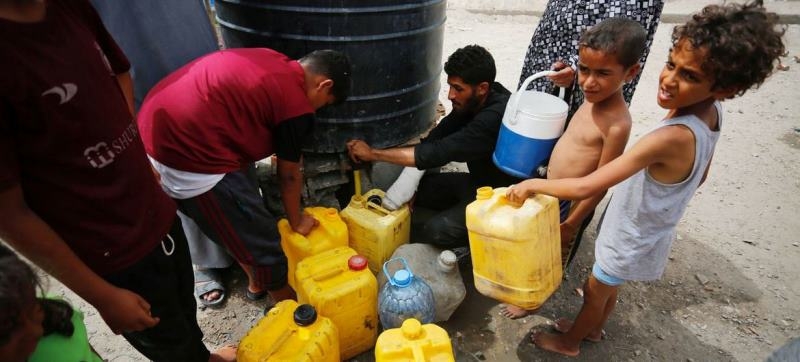- Govt to cut savings certificate profit rates from January |
- Gold prices hit fresh record in Bangladesh within 24 hours |
- Election to be held on time, Prof Yunus tells US Special Envoy |
- Moscow wants Dhaka to reduce tensions domestically, also with Delhi |
- Saarc experts meet to reduce livestock-origin greenhouse gases |
Conflict, lawlessness hamper food aid delivery in Gaza: WFP

Children collect water in the Gaza Strip. © UNRWA
14 June 2024 - Escalating fighting in the south and centre of Gaza makes it near-impossible for humanitarians to deliver desperately needed food aid, the Deputy Executive Director of the World Food Programme (WFP), Carl Skau, said on Friday at the end of a two-day mission to the enclave.
“Driving through Gaza City to Jabalia, the destruction is unbelievable. In the North of Gaza, I didn’t see one single building intact and there was constant shelling with drones buzzing overhead,” he said.
“The people here are traumatised and exhausted. One woman who had lost her husband told me this war has been going on for 250 days - but to her it felt like 250 years.”
Looting, violence and insecurity
With lawlessness born out of desperation inside Gaza now hampering deliveries from the Kerem Shalom crossing, and active conflict spreading in the southern and middle areas, WFP staff are finding it close to impossible to deliver sufficient aid to meet the growing needs.
“It is getting harder to do our job,” said Mr. Skau.
“Staff spend five to eight hours waiting at checkpoints every day. Missiles hit our premises, despite being deconflicted. The breakdown of law and order means we also face looting and violence amid a large security vacuum.”
‘Catastrophic’ hunger fears
WFP fears southern Gaza could soon see the same catastrophic levels of hunger recorded previously in the north.
Mr. Skau warned that the situation there is quickly deteriorating.
“A million people have been pushed out of Rafah and are trapped in a highly congested area along the beach in the burning summer heat. We drove through rivers of sewage,” he said.
WFP reported that there has been improvement in assistance in northern Gaza, where partners have been delivering supplies through West Erez crossing.
The UN agency warned, however, that this assistance must be sustained and scaled-up. Access to clean water, healthcare, fuel for bakeries and medical supplies are also essential.
Mr Skau stressed that “more than anything people want this war to end, and so do we.”
Supporting local markets
He said WFP will now look at how to support the functioning of markets and also get cash to people so that they can begin to restore their lives.
“Emergency assistance is still critical, but we also need to start instilling some hope – by supporting bakeries and markets - and go beyond meeting food needs for survival to support water sanitation and basic health care needs,” he continued.
“Only this way can we help restore a more dignified form of assistance that goes beyond meeting basic food needs. On my previous visit in November, the people I met were angry. Now they are exhausted and just wanted this war to end.”
Mr. Skau was in the region for three days in total. He also visited the West Bank and Jerusalem, in addition to Gaza, meeting with staff, partners and Palestinians.
In May, WFP assisted over a million people across the West Bank and Gaza, though rations were reduced due to access constraints and dwindling food stocks.
The UN agency continues to call for an immediate ceasefire in Gaza, and safe and sustained access to deliver life-saving aid.
Mounting health crisis in West Bank: WHO
Separately, the World Health Organization (WHO) said on Friday that it remains concerned about the escalating health crisis in the occupied Palestinian territory.
This includes the West Bank, where attacks on health infrastructure and increased restrictions on movements are affecting access to healthcare.
Violence has spiked since the start of the war in Gaza on 7 October, resulting in the deaths of 521 Palestinians, including 126 children, in the West Bank, including East Jerusalem. More than 5,200 people have been injured.
WHO has documented 480 attacks on healthcare, resulting in 16 deaths and 95 injuries. The attacks affected 54 health facilities, 20 mobile clinics and 319 ambulances. – UN News

